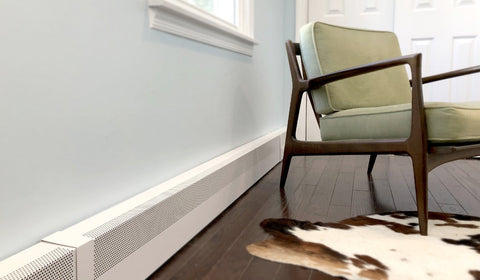Hydronic Baseboard Heating Safety

Safety is paramount, especially if you have little people and pets running around at home. Outlet covers, cabinet locks, and baby gates help you make the home accessible and safe for everyone. But what about how you heat your home?
Every form of home heating has its risks and benefits. Forced air needs filter changes and carbon monoxide detectors to reach ultimate safety levels. Electric baseboard heat produces no emissions but may have a heating element more exposed than other forms of heat. Radiant heat has no exposed elements but can be more difficult to maintain.

Determining the "safest" form of heating for a home involves considering various factors, including safety features, potential risks, and proper usage.
Hydronic baseboard heaters are generally considered safe when installed and used correctly. However, as with any heating system, it's important to be aware of potential safety considerations. Here’s how to ensure hydronic heat is safe for every member of your family.

Proper Installation: Ensure that the installation is done by a professional to meet safety standards. Proper sizing, adequate clearances from combustible materials, and correct placement are crucial for safety.
Regular Maintenance: Keep the heater clean and well-maintained. Dust and debris buildup can affect its efficiency and, in extreme cases, pose a fire hazard.

Temperature Regulation: Use a thermostat to control the temperature and prevent overheating. Avoid setting the temperature too high, as it could lead to overheating or create a fire risk.
Clearance: Maintain adequate clearance around the heater. Keep furniture, curtains, and any other combustible materials away to prevent the risk of fire.

Child and Pet Safety: Take precautions to prevent accidental contact with the heater. Hydronic baseboard heater covers get warm, but never so hot they can burn. However, teach children and pets of the dangers of hot surfaces and exercise caution around the unit.
Leaks and Maintenance of the Hydronic System: Check for any leaks in the hydronic system regularly. Leaks can cause water damage, and if the hot water comes into contact with electrical components, it can pose an electrical hazard.

Carbon Monoxide Monitoring: If the system is connected to a boiler, ensure proper ventilation and install carbon monoxide detectors. Though hydronic systems don't produce CO as they are sealed systems, the boiler or gas-fired heater connected to it might, so it's essential to have proper detectors.
Professional Inspection: Consider periodic inspections by a professional to ensure that the system operates efficiently and safely.
Always refer to the manufacturer's guidelines and follow recommended safety practices outlined in the user manual. If you notice any issues or have concerns about the heater's safety, it's advisable to have a professional technician inspect it.
